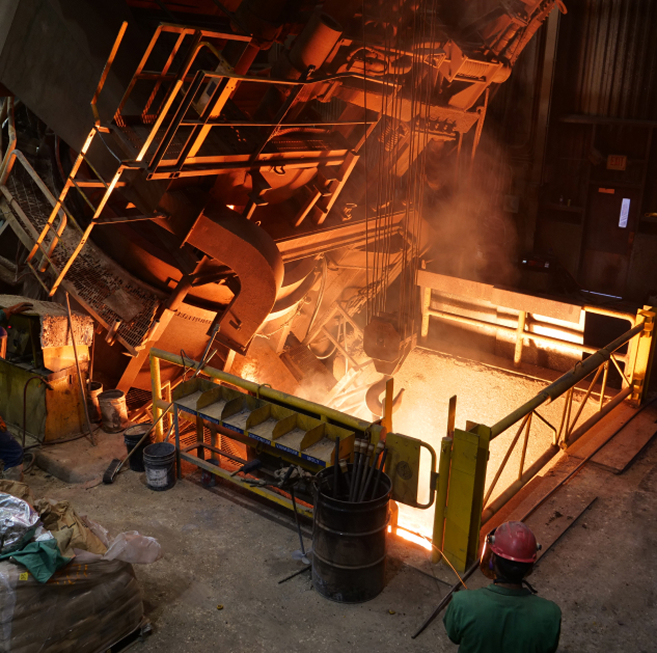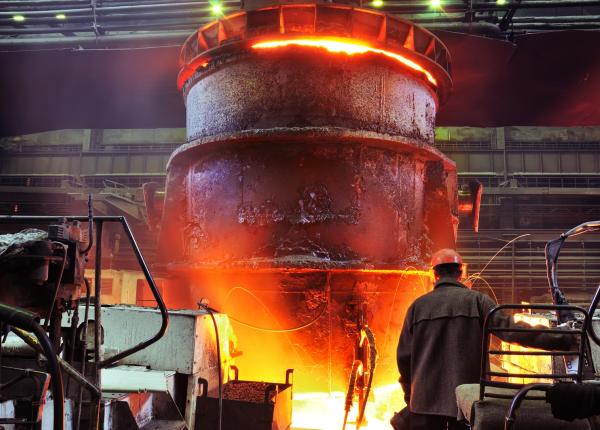A Comprehensive Guide to Metal Casting: Benefits and Solutions Offered by Foundries
Metal casting is a critical process in numerous industries, providing countless benefits via the solutions of shops. These facilities change molten metal into specific and resilient parts, catering to details client demands. By employing sophisticated modern technologies, factories assure quality and effectiveness in manufacturing. The intricacies of metal casting and the diverse techniques entailed raise essential questions about its function in modern manufacturing. What innovations exist ahead in this essential field?
Comprehending the Metal Casting Process
The metal casting process is an essential method made use of in producing to produce complicated shapes and parts. This approach includes pouring liquified metal into a mold and mildew made to develop the preferred item. The procedure begins with pattern creation, which acts as a design template for the mold. Metal Casting. Different products, such as sand, metal, or ceramic, are used for mold-making, depending upon the particular needs of the casting
As soon as the mold is ready, molten metal is put into it and permitted to strengthen and cool down. After solidification, the mold is gotten rid of, exposing the actors part. Numerous techniques, consisting of sand casting, investment casting, and pass away casting, are employed, each matched to different applications and materials. Quality assurance actions, such as assessments and testing, are important to guarantee the last product satisfies specifications. Overall, the metal casting procedure plays a crucial role in creating components for sectors ranging from automobile to aerospace.
Trick Perks of Metal Casting
Metal casting uses substantial benefits that make it a preferred production approach in various sectors. Its layout adaptability and precision enable intricate forms, while cost-efficient mass manufacturing boosts effectiveness. Additionally, the versatility and toughness of materials utilized in casting add to the resilience of the last items.
Style Versatility and Precision
Launching remarkable design adaptability and accuracy, metal casting permits designers and designers to develop intricate shapes and features that would be impossible or challenging to attain with various other producing methods. This ability allows the manufacturing of intricate geometries, internal structures, and fine details that boost item capability and looks. In addition, numerous casting methods, such as sand casting, financial investment casting, and pass away casting, supply additional alternatives for customization, accommodating diverse material residential or commercial properties and job demands. The flexibility of mold and mildews allows modifications during the layout stage, simplifying the change from idea to end product. Ultimately, metal casting stands apart for its capability to deliver high-precision elements, making it an invaluable procedure in industries ranging from automobile to aerospace and beyond.
Affordable Mass Production
Cost-effective automation stands as one of the key benefits of metal casting, making it possible for makers to create large amounts of components at a reduced cost each. This effectiveness emerges from the capability to create detailed mold and mildews that can be recycled several times, considerably minimizing setup and functional prices. Furthermore, metal casting processes, such as sand casting and die casting, permit high throughput, making it practical to meet the needs of massive production runs. The lowered material waste and power consumption additionally boost expense financial savings, making metal casting an eye-catching option for markets requiring bulk parts. Generally, the affordable nature of metal casting settings it as a preferred approach for makers aiming for economic effectiveness in their production procedures.
Product Convenience and Toughness
Among the standout features of metal casting is its remarkable material adaptability, which enables making use of a large range of steels and alloys. This adaptability allows suppliers to pick products that best fit their particular applications, from aluminum and bronze to iron and steel. Each metal supplies special residential properties, including varying levels of toughness, deterioration resistance, and thermal conductivity. Metal casting can create parts that fulfill stringent efficiency needs throughout varied markets, such as automobile, aerospace, and construction. Additionally, the strength of cast steels can be boosted via numerous therapy processes, guaranteeing longevity and long life. Metal Casting. In general, the combination of material convenience and intrinsic strength makes metal casting a recommended selection for creating premium components
Types of Metal Casting Strategies
Metal casting includes a variety of strategies that deal with different manufacturing requirements and product buildings. Usual approaches consist of sand casting, which uses a sand mold for complex shapes, and financial investment casting, known for its accuracy and surface coating. Pass away casting is one more strategy that utilizes high-pressure injection of molten metal right into mold and mildews, ideal for mass manufacturing of small components.
Shell molding offers a quicker different, using a resin-coated sand to develop thin-walled mold and mildews, while lost foam casting enables intricate styles without the need for a core.
Furthermore, constant casting is used for producing long areas of metal, such as sheets or bars, by strengthening liquified metal in a continual process. Each method is and presents one-of-a-kind advantages chosen based upon factors like the needed information, production volume, and material kind, guaranteeing superior outcomes in metal construction throughout various sectors.
The Function of Foundries in Metal Casting
Shops play an essential duty in the metal casting procedure, working as the centers where liquified metal is transformed into completed items. These specialized facilities are equipped with the required devices and modern technologies to take care of various metals, making sure premium results. Foundries are in charge of several vital features, including thawing the metal, putting it right into mold and mildews, and permitting it to strengthen.
Additionally, they maintain strict safety and environmental standards to safeguard workers and minimize environmental influence. Experienced service technicians and designers collaborate to maximize casting processes, enhancing efficiency and minimizing waste. Shops additionally participate in top quality control actions, guaranteeing that the last items meet specific tolerances and specifications. This quality control is essential for industries that count on specific parts, such as vehicle and aerospace. Because of this, factories Metal Casting add significantly to the general manufacturing landscape, enabling technology and growth across numerous sectors.
Custom Metal Casting Providers
Custom-made metal casting services supply tailored layout solutions that fulfill certain customer demands. These services additionally offer product choice know-how, guaranteeing the right metal is selected for the desired application. Such adaptability and understanding boost the overall top quality and performance of the last item.

Customized Style Solutions
Customized layout remedies in metal casting provide manufacturers with the flexibility to create components that meet particular performance and aesthetic requirements. Foundries offer customized solutions that enable clients to define dimensions, forms, and surface area finishes to accomplish wanted end results. This personalization procedure frequently consists of cooperation between developers and designers, ensuring that the final products line up with functional demands and market criteria. Advanced technologies, such as computer-aided layout (CAD) and simulation software, allow precise modeling and testing of parts before production, improving and minimizing mistakes effectiveness. By leveraging tailored layout remedies, services can optimize capability while minimizing waste and costs, inevitably causing a more one-upmanship in the marketplace. This versatility is necessary for sectors needing unique applications and requirements.
Material Option Know-how
When choosing products for metal casting, competence plays an important duty in guaranteeing that the right option straightens with both performance needs and cost-effectiveness. Foundries utilize experienced specialists who comprehend the residential properties of various metals and alloys, allowing them to advise perfect products for specific applications. Elements such as toughness, corrosion resistance, and thermal conductivity are meticulously considered to satisfy the customer's demands. Additionally, market fads and developments in material science educate these decisions, allowing foundries to remain competitive. By leveraging their experience, factories can aid customers in guiding with complex product options, eventually bring about improved item quality and decreased production prices. This specific understanding is crucial for accomplishing effective results in custom metal casting services.
Quality Assurance in Metal Casting
Quality control in metal casting is vital to assure that the end products fulfill the called for requirements and efficiency criteria. Shops use a selection of techniques and strategies to guarantee the finest quality of cast components. This procedure starts with rigid product inspections, validating that resources follow industry criteria. Throughout the casting procedure, real-time surveillance and screening are performed to analyze specifications such as temperature level, mold integrity, and dimensional precision.

Applications of Metal Castings Across Industries
Metal spreadings play a vital role in various sectors, working as the foundation for numerous applications. In the auto industry, cast parts such as engine blocks and transmission housings are essential for car efficiency and reliability. The aerospace market relies on precision spreadings for crucial parts that guarantee safety and effectiveness in trip. Furthermore, the building and construction sector makes use of metal spreadings for components, installations, and architectural components, improving the longevity of buildings and infrastructure.
Additionally, the energy sector take advantage of spreadings utilized in turbine blades and various other tools necessary for power generation - Aluminum Casting. The medical field likewise uses metal spreadings in tools and tools, demonstrating the versatility of this production process. Generally, metal castings are indispensable to the performance and development of varied industries, showcasing their importance in contemporary technology and framework development
Regularly Asked Questions
What Products Are Frequently Used in Metal Casting?
Typical materials utilized in metal casting include aluminum, iron, steel, brass, and bronze. Each product offers special homes ideal for various applications, enabling suppliers to choose the most effective option based upon rust, weight, and strength resistance.
The length of time Does the Metal Casting Process Normally Take?
The metal casting procedure generally takes several hours to a couple of days, depending upon factors such as the intricacy of the design, kind of metal utilized, and the particular casting method utilized by the foundry.
What Is the Environmental Effect of Metal Casting?
The environmental effect of metal casting consists of energy consumption, emissions, and waste generation. Shops commonly carry out actions to alleviate these results, such as reusing materials and making use of cleaner modern technologies to minimize their ecological footprint.
Can Metal Casting Be Provided For Small-Scale Projects?
Metal casting can undoubtedly be done for small tasks. Numerous factories satisfy such requirements, using personalized services that accommodate limited manufacturing runs while keeping top quality and accuracy in the final products.
What Are the Precaution in Metal Casting Foundries?
In metal casting shops, safety actions include personal safety tools, appropriate ventilation, training on tools usage, emergency situation treatments, routine maintenance checks, and adherence to market safety and security requirements to decrease risks linked with liquified metal and dangerous materials.
In addition, metal casting processes, such as sand casting and die casting, permit for high throughput, making it possible to meet the needs of large-scale manufacturing runs. One of the standout attributes of metal casting is its exceptional material versatility, which permits for the use of a wide variety of alloys and steels. Additionally, continual casting is used for generating long areas of metal, such as bars or sheets, by strengthening molten metal in a continuous procedure. Foundries play a crucial role in the metal casting procedure, offering as the facilities where molten metal is transformed into finished products. Common products made use of in metal casting consist of light weight aluminum, iron, bronze, steel, and brass.